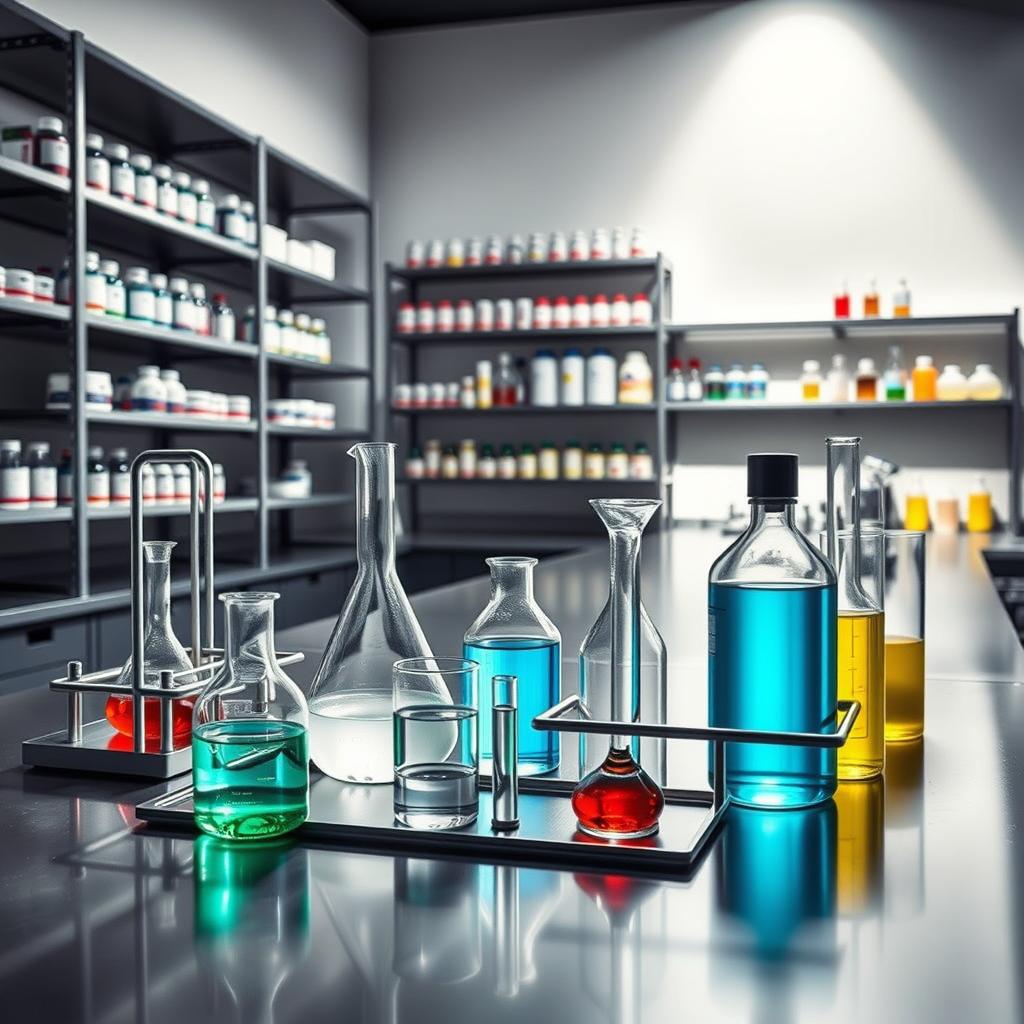What makes a swimming pool safe and fun for everyone? It’s the chemicals used to keep the water clean and prevent bacteria. Chlorine and bromine are key for killing harmful germs. pH balancers also keep the water’s pH level just right, avoiding irritation and damage to equipment. The right pool cleaning products are vital for a healthy and fun swim.
Click to use Silverigroup personal shopper services
Key Takeaways:
- Chemicals for swimming pools are essential for maintaining water quality and preventing bacteria growth.
- Pool chemicals, such as chlorine and bromine, are used for disinfecting and killing harmful microorganisms.
- pH balancers help maintain a neutral pH level to prevent irritation and equipment damage.
- The right pool cleaning products can make a difference in ensuring a healthy and enjoyable swimming experience.
- Understanding the basics of pool water chemistry is crucial for any pool owner.
- Regular maintenance and testing are necessary to ensure the pool remains safe and healthy.
Understanding the Basics of Pool Water Chemistry
Keeping your pool clean and safe is key. Knowing about pool water chemistry is very important. It helps keep the water balanced and healthy for swimming. Testing the water regularly is a must. It stops problems like algae and eye irritation. This way, everyone can enjoy the pool without worries. Ph balance for pools is especially important. The best pH range is 7.2 to 7.8. If it’s off, it can hurt your eyes and skin, and damage your pool equipment.
Click to buy citric acid from Silvairgroup
Why Pool Chemistry Matters
Pool chemistry is vital for safety and health. Bad water chemistry can spread sickness. It can also ruin your pool equipment, costing you a lot of money.
Essential Water Parameters to Monitor
There are key things to watch in your pool water. These include:
- pH levels
- Chlorine levels
- Total alkalinity
- Cyanuric acid levels
Checking and adjusting these regularly keeps your pool in top shape.
Essential Chemicals For Swimming Pools
Keeping a swimming pool clean and safe is key. Pool water treatment uses different chemicals to get rid of dirt and stop harmful growths. Chlorine is a main sanitizer that kills bacteria and germs. Bromine is used in spas because it works well in warm water. Pool shock treatment is also important. It removes organic stuff that can build up. This treatment keeps sanitizers working and stops algae from growing. pH balancers are also used to keep the water’s pH just right. Some important chemicals for pool care are:
- Sanitizers: chlorine, bromine
- pH balancers: soda ash, muriatic acid
- Algaecides: copper-based, quaternary ammonium compounds
Click to buy Beluga Fresh Frozen from Silverigroup
Testing and upkeep are vital for safe and clean pool water. Using the right chemicals and sticking to a maintenance plan makes swimming fun and healthy.
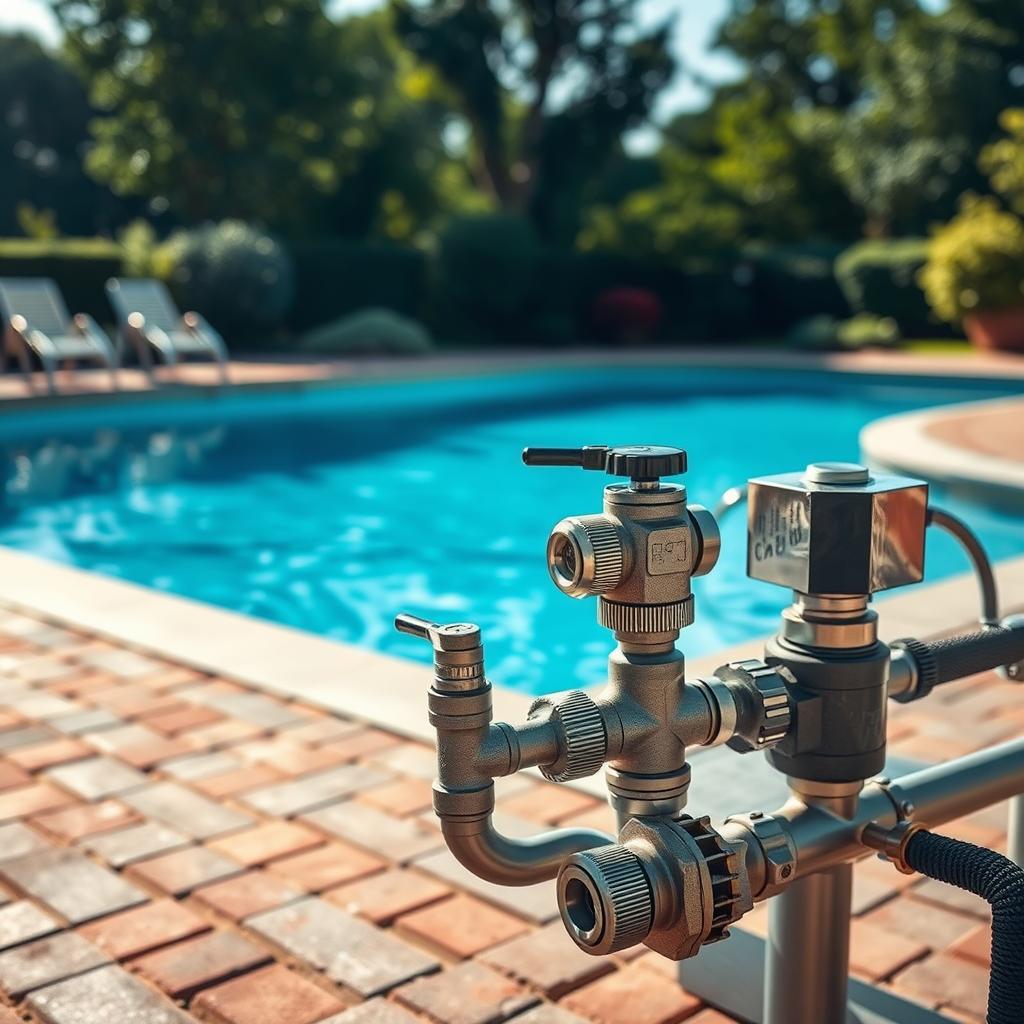
| Chemical | Function |
|---|---|
| Chlorine | Sanitizer |
| Bromine | Alternative sanitizer |
| pH balancers | Maintain optimal pH level |
Chlorine: The Primary Sanitizer
Chlorine is key for keeping pool water clean and safe. It comes in liquid, granular, and tablet forms. These forms kill harmful germs. Chlorine is the main sanitizer in pool cleaning products.
Different Forms of Chlorine
There are many types of chlorine products. Each has its own benefits and drawbacks. Here are a few:
- Liquid chlorine: Easy to use and very effective.
- Granular chlorine: Often in tablet form, it lasts longer.
- Tablet chlorine: Releases chlorine slowly, keeping water sanitized.
Proper Chlorine Application Methods
To use chlorine right, you need to test the water often. This helps find the best chlorine levels. Using the right chemicals and following the right steps keeps the pool water clean and safe.
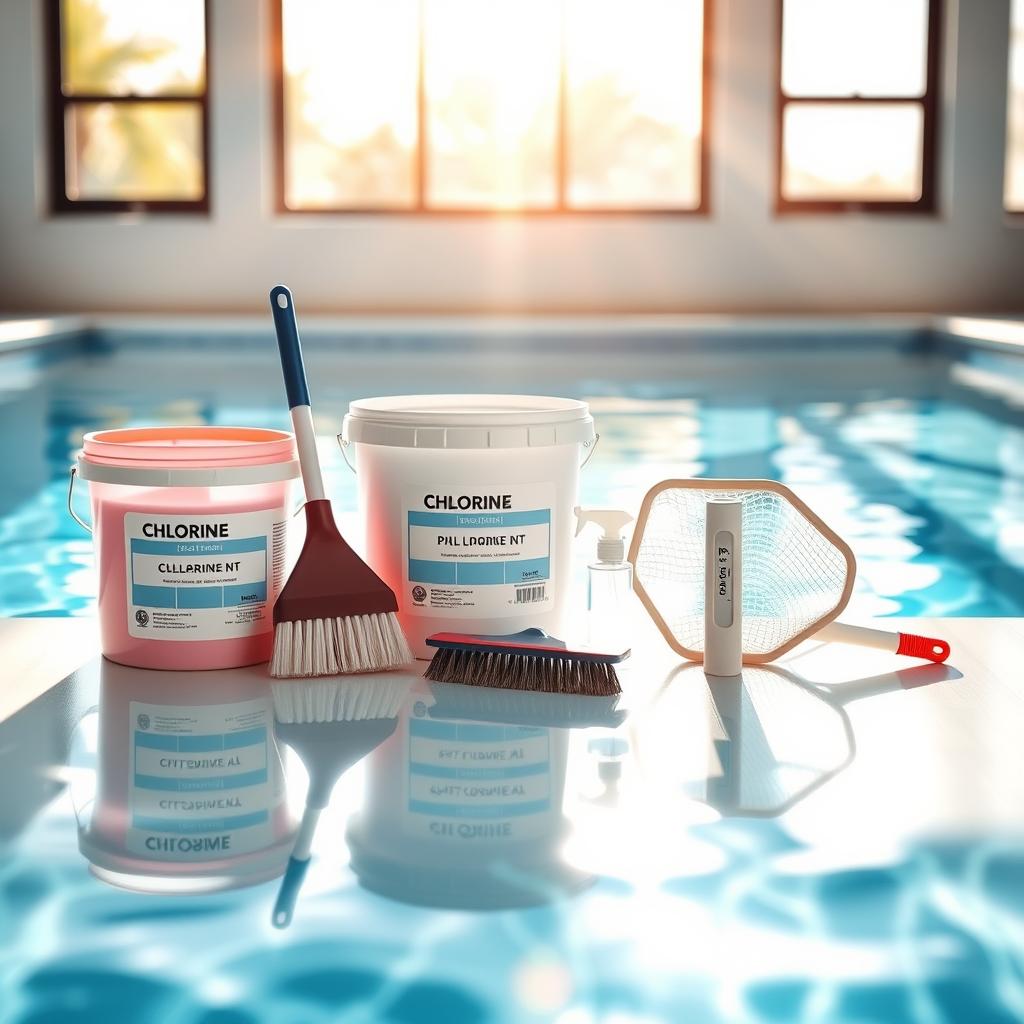
Maintaining Optimal Chlorine Levels
Keeping the right chlorine levels is important for pool safety. Regular water tests help adjust chlorine levels. With the right products and care, pools stay clean and safe for everyone.
| Chlorine Level | Recommended Action |
|---|---|
| Low | Increase chlorine dosage |
| Optimal | Maintain current chlorine dosage |
| High | Decrease chlorine dosage |
Bromine and Alternative Sanitizers
When it comes to pool chemicals for swimming pool maintenance, bromine is a top choice. It’s great for spas because it works well in warm water. This makes it perfect for hot tubs and whirlpools. Bromine fights off bacteria, viruses, and other bad stuff in pool water.
Other options for swimming pool maintenance include saltwater systems and ozone generators. Saltwater systems make chlorine from salt. Ozone generators use ozone to clean the water. Each has its own good points and downsides, depending on the pool’s needs.
Some perks of these alternatives are:
- Less eye and skin irritation
- Lower chlorine levels
- Better water clarity and quality
Choosing the right sanitizer for pool chemicals and swimming pool maintenance is key. It depends on the pool’s size, type, and how clean you want the water. The right choice keeps the water safe and healthy for everyone.
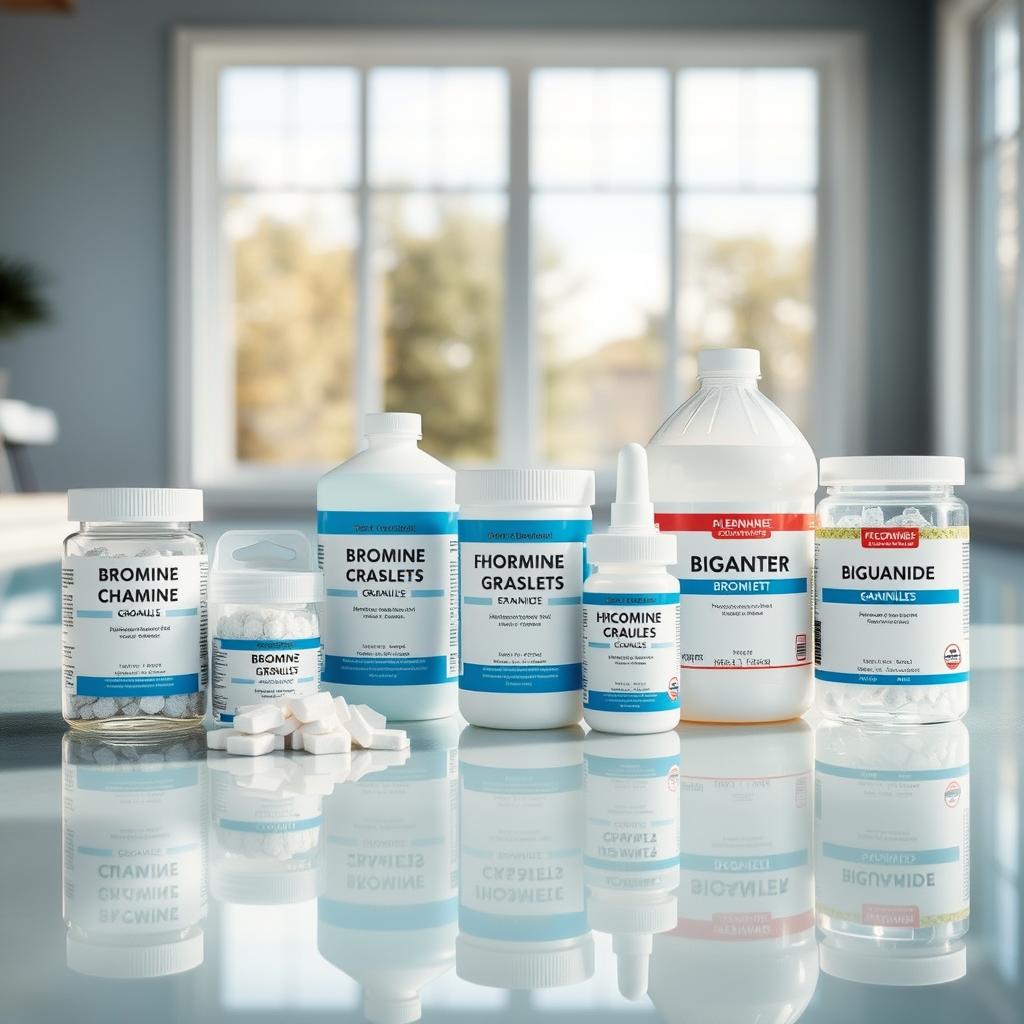
Balancing pH Levels in Your Pool
Keeping the pH level right in your pool is key for a safe swim. It should be between 7.2 and 7.6. This stops irritation and protects your pool gear. You’ll need pH balancers like sodium carbonate and sodium bisulfate to keep it balanced. It’s important to check your pool’s pH often. Not doing so can cause problems like eye and skin issues, and damage to your pool. Using pH increasers and decreasers helps keep your pool water healthy and safe for everyone.
pH Increasers and Their Use
pH increasers, like sodium carbonate, help when your pool water is too acidic. This might happen after rain or with certain sanitizers. Adding a pH increaser quickly fixes the pH and keeps your pool and swimmers safe.
pH Decreasers and Application
pH decreasers, like sodium bisulfate, are for when your pool water is too alkaline. This can cause scaling and harm your equipment. Adding a pH decreaser lowers the pH and keeps your pool in good shape.
| pH Level | Effect on Swimmers | Effect on Equipment |
|---|---|---|
| Too Acidic (below 7.2) | Irritation to eyes and skin | Corrosion of equipment |
| Too Alkaline (above 7.6) | Dry skin and hair | Scaling and damage to equipment |
| Neutral (7.2-7.6) | No irritation or discomfort | No damage or corrosion |
Knowing how to balance your pool’s pH is crucial. Using pH increasers and decreasers keeps your pool safe and your equipment working well. Regular care and pH checks are vital for a great swimming experience.
Algaecides and Preventive Treatments
Algaecides for pools are key to keeping water clean and safe. They stop algae from growing. There are copper-based and non-copper based algaecides. Copper-based ones fight many algae but can stain surfaces and equipment. Non-copper based ones are safer but might not work as well against all algae.
Using pool cleaning products, like algaecides, with other maintenance is important. This includes testing and balancing water chemistry. Cyanuric acid also helps keep chlorine effective. By using these products, pool owners can keep their pools clean and safe for everyone.
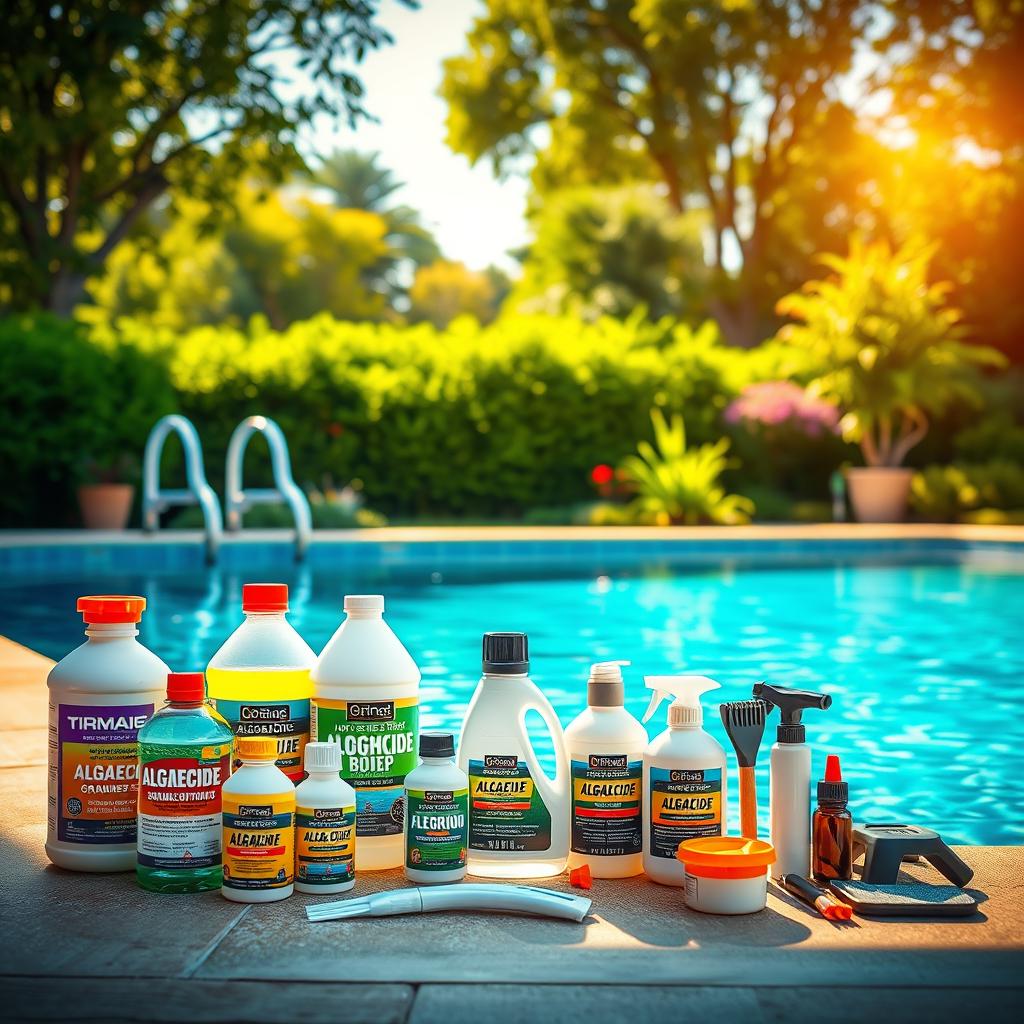
- Copper-based algaecides, such as copper sulfate and copper chloride
- Non-copper based algaecides, such as polyquat and bronopol
- Quaternary ammonium compounds (quats), which are effective against a wide range of algae
Shock Treatments and When to Use Them
Keeping your pool clean and safe is key. Shock treatments, like calcium hypochlorite or non-chlorine oxidizers, are crucial. They remove organic contaminants from the water. These can come from sweat, body oils, and debris. There are various pool shock types, each with its own benefits. Some common ones include:
- Calcium hypochlorite: a strong oxidizer that is effective at breaking down organic contaminants
- Non-chlorine oxidizers: a gentler alternative to calcium hypochlorite that is still effective at breaking down contaminants
Choosing the right pool shock is vital. Always follow the manufacturer’s instructions for use. Regular shocking can: Improve water clarity and quality
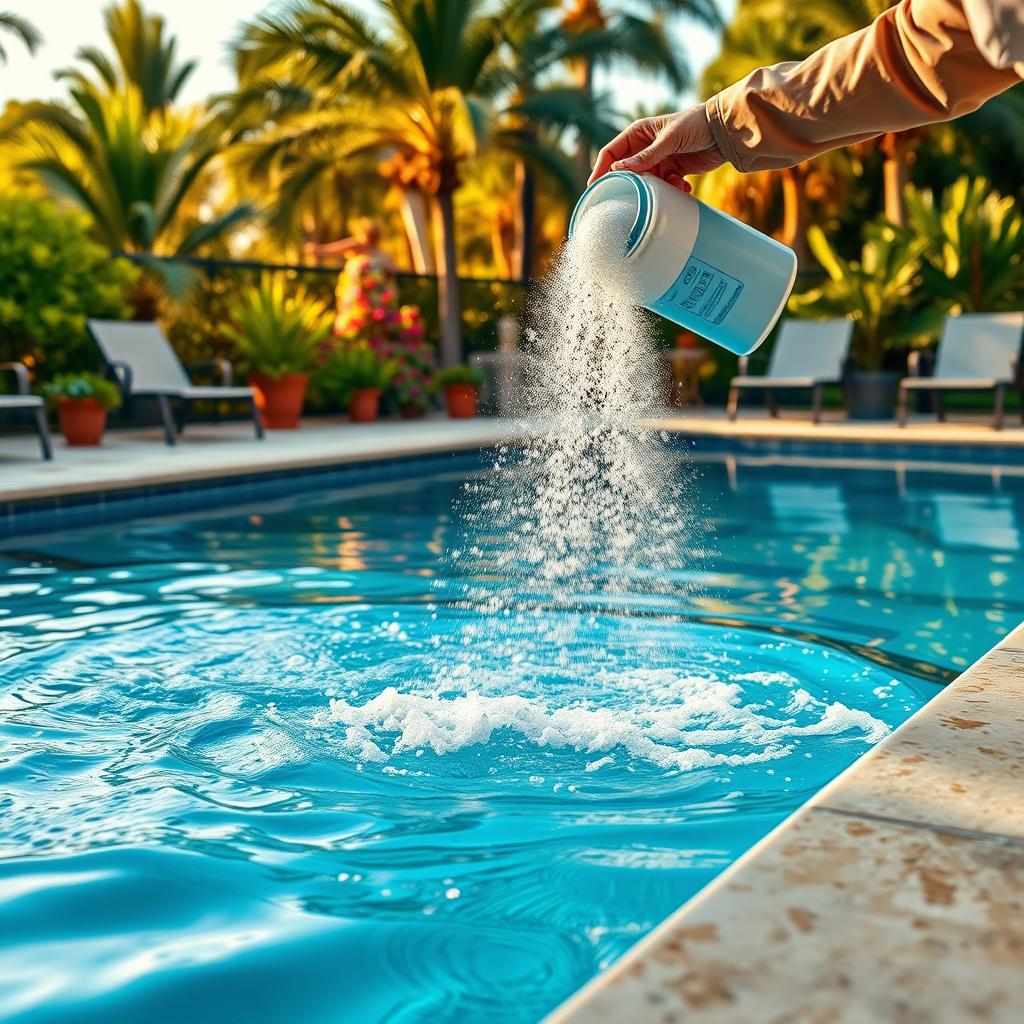
Regular pool shock treatment is essential for a clean, safe pool. It ensures everyone can enjoy the water.
| Type of Pool Shock | Characteristics | Uses |
|---|---|---|
| Calcium Hypochlorite | Strong oxidizer | Breaking down organic contaminants |
| Non-Chlorine Oxidizers | Gentler alternative | Breaking down contaminants without chlorine |
Water Clarifiers and Flocculants
Keeping your pool water clean and safe is crucial. Water clarifiers and flocculants play a big role in this. They help get rid of tiny particles, making the water clearer and reducing filter cleaning needs. Using these products in your pool care routine makes swimming healthier and more enjoyable. To use clarifiers and flocculants, add a small amount to the pool water. Let it mix and circulate. This helps particles stick together, making them easier to filter out. The benefits include:
- Improved water clarity
- Reduced filter maintenance
- Increased efficiency of pool water treatment systems
When using flocculants, always follow the instructions and safety tips. Wear gloves and goggles, and make sure the area is well-ventilated. By doing this, you can make your swimming experience cleaner, safer, and more fun.
Specialty Chemicals for Specific Issues
Chemicals for swimming pools are key to keeping the water healthy and safe. Besides regular cleaners, there are special chemicals for certain problems. For example, calcium hardness increasers stop equipment and surfaces from corroding. Metal sequestrants help control mineral buildup.
These special pool chemicals are vital for the pool’s quality and safety. Adding them to your routine can prevent corrosion, staining, and cloudy water. Some common ones include:
- Calcium hardness increasers to prevent corrosion
- Metal sequestrants to control mineral buildup
- Stain removers to remove unsightly stains
- Cloud clarifiers to clear up cloudy water
Using these chemicals keeps your pool safe and enjoyable for years. Always follow the instructions and be careful when handling chemicals for swimming pools. Regular checks and upkeep can spot problems early. Keeping your pool well-maintained shows you care about it. With the right pool chemicals, you can swim with confidence and peace of mind.
Seasonal Chemical Maintenance Guide
Keeping the right chemical balance is key for a safe and fun swimming pool. As seasons change, so do the pool’s chemical needs. A good maintenance plan can prevent problems and keep your pool clean and healthy all year.
Pool water treatment varies with the season. In spring, shock treatments and algae prevention are needed to prepare the pool. Summer requires regular chemical checks to avoid algae and cloudy water.
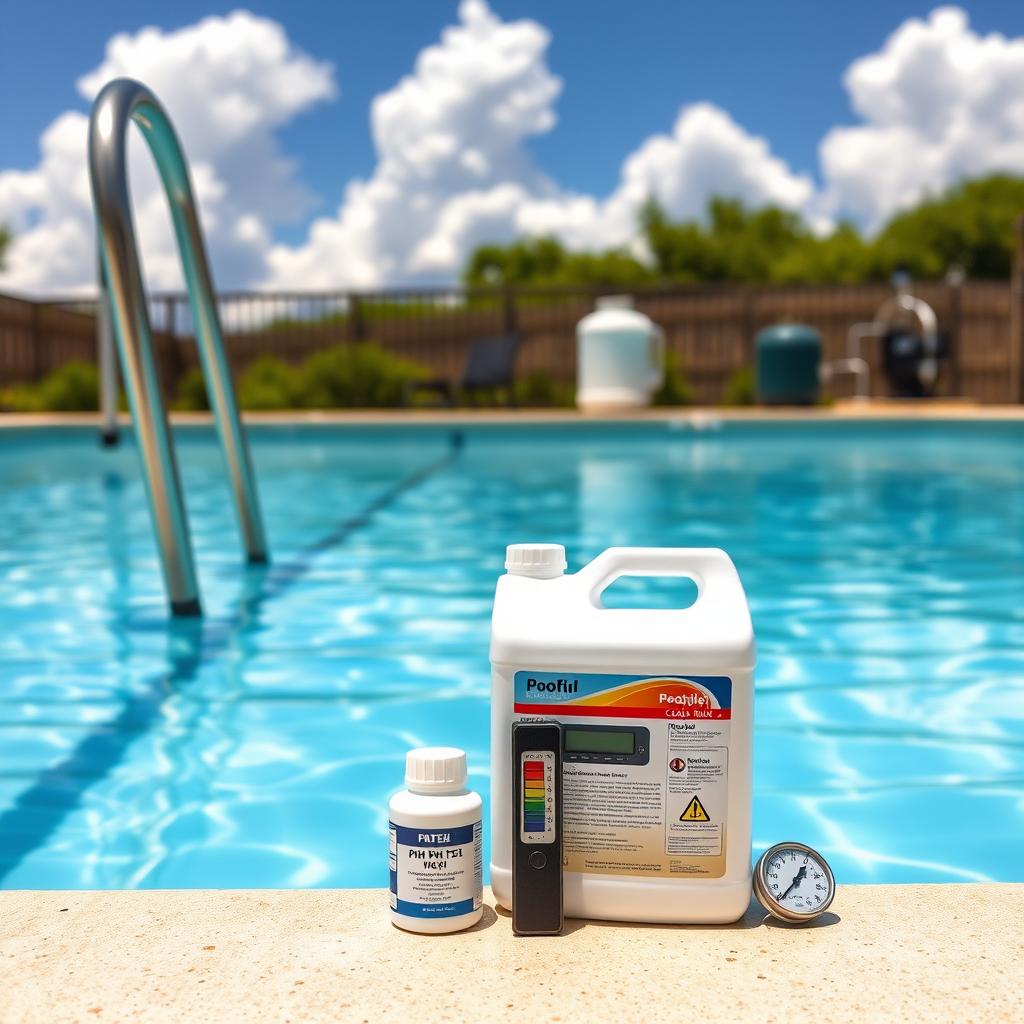
Spring Opening Treatments
Springtime in the pool means several steps to get it ready. Shock treatments remove old contaminants, and algae prevention keeps it clean. Regular treatment is also crucial for the right chemical balance.
Summer Maintenance Schedule
Summer calls for a consistent maintenance routine. This includes testing the water, balancing chemicals, and cleaning the pool and equipment. A well-planned summer schedule ensures a safe and healthy pool all season.
Winter Closing Procedures
Winter means getting the pool ready for a break. Using winterizing chemicals protects it from freezing damage. Proper closing procedures help your pool last longer and stay in good shape for next year.
Conclusion
Managing pool chemicals is key to a clean and safe swimming experience. This guide has shown how important it is to use chlorine, pH balancers, and algaecides correctly. These steps help keep the water clear and the pool safe. Whether you’re getting your pool ready for summer or just doing regular upkeep, knowing your chemicals is essential. By following a seasonal chemical plan, you can keep your pool clean and inviting. This way, your family and friends can enjoy a safe and sparkling pool all season.
FAQ: Chemicals For Swimming Pools
What are the essential chemicals used in swimming pool maintenance?
Essential pool maintenance chemicals include chlorine, bromine, and pH balancers. Algaecides and shock treatments are also key. These help keep the water clean, balanced, and free from algae and contaminants.
Why is it important to maintain proper pool water chemistry?
Proper water chemistry is vital for a safe swimming environment. It prevents irritation, damage to equipment, and harmful microorganisms. Monitoring pH, chlorine/bromine, and alkalinity levels is crucial.
How do I test my pool water and what should I be testing for?
Regular water testing is essential. Test for pH, free chlorine/bromine, total alkalinity, and calcium hardness. Use test kits or have a professional service test your water.
What is the role of chlorine in swimming pool maintenance?
Chlorine is the main sanitizer in pools. It comes in liquid, granular, or tablet form. It disinfects the water and kills harmful microorganisms. Keeping chlorine levels right is key to a clean pool.
When and how should I perform shock treatments on my pool?
Shock treatments are vital for cleaning the pool. Use calcium hypochlorite or non-chlorine oxidizers. Do it weekly or after lots of swimmers to keep the water clean.
How do pH balancers work, and why is it important to maintain proper pH levels?
pH balancers, like sodium carbonate and sodium bisulfate, keep the pH level right. Aim for 7.2 to 7.6. This prevents irritation and damage, and keeps sanitizers working well.
What role do algaecides play in pool maintenance?
Algaecides stop algae growth in pools. They keep the water clear and free of algae. This is important for a clean and safe swimming environment.
How do water clarifiers and flocculants improve pool water quality?
Clarifiers and flocculants clear the water by removing small particles. They make it easier for filters to clean the water. This improves clarity and quality.
What are some specialty chemicals that can be used to address specific pool issues?
Specialty chemicals like calcium hardness increasers and metal sequestrants solve specific problems. They prevent corrosion and control mineral buildup and staining.
How do I adjust my pool chemical maintenance routine for different seasons?
Adjust your maintenance routine with the seasons. In spring, shock and prevent algae. Summer needs regular testing and balancing. Winter uses winterizing chemicals to protect your pool and equipment.

